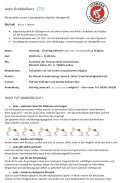Article 13 of the Paris Agreement: What You Need to Know
The Paris Agreement is a landmark accord that was adopted by 195 countries in 2015 with the objective of limiting global warming to well below 2 degrees Celsius above pre-industrial levels. One of the key provisions of the agreement is Article 13, which focuses on enhancing transparency and accountability in the reporting and review of national climate pledges.
Here is a breakdown of what Article 13 entails:
1. Transparency Framework
Article 13 establishes a transparency framework that requires countries to report regularly on their progress in meeting their climate targets, as well as on their emissions, mitigation efforts, and adaptation measures. The framework aims to promote openness, clarity, accuracy, completeness, and comparability in reporting, and to facilitate the review and assessment of countries` efforts by independent experts.
2. Biennial Transparency Reports
Under Article 13, countries are required to submit biennial transparency reports that include information on their greenhouse gas emissions, removals, and sources, as well as on their policies and measures related to climate change. The reports should also include information on financial, technological, and capacity-building support provided and received by countries, as well as on their progress in meeting their adaptation needs.
3. Technical Expert Review
The transparency framework established by Article 13 includes a technical expert review process that assesses the accuracy, completeness, and consistency of countries` reports, as well as their compliance with the reporting guidelines and standards. The review is conducted by teams of experts from other countries and international organizations, and the findings are shared with the country concerned for their response and clarification.
4. Facilitative Multilateral Consideration
Article 13 also provides for a facilitative multilateral consideration process that aims to identify areas where countries can enhance their ambition and implementation of their climate targets and actions. This process involves a review of the collective progress of countries in achieving the objectives of the Paris Agreement, as well as of the support provided and received by countries.
5. Capacity Building
Article 13 recognizes the importance of providing developing countries with the necessary support and capacity building to enable them to meet their reporting requirements and enhance their participation in the transparency framework. The article calls for the provision of financial, technological, and capacity-building support to such countries, taking into account their specific needs and circumstances.
In conclusion, Article 13 of the Paris Agreement is an essential provision for ensuring that countries are held accountable for their climate pledges and efforts. The transparency framework and review processes established by the article promote openness, accuracy, and comparability in reporting, and help to identify areas where countries can enhance their ambition and implementation. The article also recognizes the importance of providing developing countries with the necessary support and capacity building to facilitate their participation in the transparency framework.











